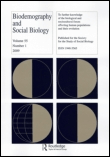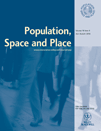
Novedades en Poblacion
metrics 2024
Advancing Knowledge in Demographic Studies
Introduction
Novedades en Poblacion is a pivotal academic journal dedicated to the interdisciplinary exploration of demographic studies, population policies, and social dynamics, published by UNIV HABANA. Since its inception in 2005, this open access journal has provided a platform for researchers, professionals, and students to disseminate and discuss cutting-edge research and findings relevant to populations in Latin America and beyond. With a commitment to high-quality scholarship, Novedades en Poblacion plays a vital role in contributing to the global conversation on demographic changes, migration patterns, and socio-economic impacts on populations. Researchers are encouraged to submit original articles, reviews, and studies that advance the understanding of demographic issues, making it an essential resource for those engaged in the fields of sociology, public health, and urban studies.
Metrics 2024
 -
- 0.20
0.20 0.20
0.20 -
-Metrics History
Rank 2024
IF (Web Of Science)
JCI (Web Of Science)
Quartile History
Similar Journals

DEMOGRAPHY
Exploring the dynamics of demographic change.DEMOGRAPHY is a prestigious, peer-reviewed journal published by DUKE UNIVERSITY PRESS, dedicated to advancing the field of demography through scholarly research and critical discourse. With an esteemed Q1 ranking in Social Sciences and an impressive Scopus rank of #10 out of 139 in the category, this journal holds a 93rd percentile status, reflecting its significant impact on the academic community. Covering a wide range of topics related to population studies, including fertility, mortality, migration, and demographic change, DEMOGRAPHY serves as a vital resource for researchers, professionals, and students alike. Since its inception in 1964, it has provided a platform for innovative studies and influential articles that address both theoretical frameworks and applied research. Although not an open-access journal, it ensures that its contributions reach a global audience while maintaining rigorous academic standards. Engage with DEMOGRAPHY to explore and contribute to the dynamic discussions shaping our understanding of human populations in a complex world.

Biodemography and Social Biology
Bridging Disciplines to Enhance Understanding of Human SocietiesBiodemography and Social Biology is a distinguished academic journal published by Routledge Journals, Taylor & Francis Ltd, focusing on the intersections of demographic and biological sciences. With its ISSN 1948-5565 and E-ISSN 1948-5573, this journal contributes significantly to the fields of anthropology, demography, and social biology, making it an essential resource for researchers and professionals alike. The journal has consistently achieved high rankings, notably placing in Q2 in both anthropology and demography, underlining its impact in these critical areas of study. Although it does not provide Open Access options, the journal's rigorous peer-review process ensures the highest quality of academic discourse and research dissemination. Covering a wide scope of topics related to human population dynamics, health, and behavior, Biodemography and Social Biology serves as a vital platform for advancing knowledge and understanding of the biological and social factors influencing human societies since its inception in 1990. Researchers, students, and professionals are invited to contribute their findings and insights, enriching the academic conversation that this journal fosters.

Population Space and Place
Exploring the Dynamics of Population and SpacePopulation Space and Place is an esteemed academic journal published by WILEY, dedicated to advancing the fields of demography and geography, planning, and development. With an impressive 2023 impact factor and categorized in the top quartile (Q1) for both demography and geography, this journal serves as a vital platform for researchers, professionals, and students seeking to explore the spatial dimensions of population dynamics. Founded in 2004 and running through 2024, it has established itself as a significant contributor to scholarly discussions, evidenced by its high Scopus rankings, including rank #18 out of 139 in demography and #165 out of 821 in geography and planning. While the journal currently does not offer open access, it remains a key resource for those involved in academic research and policy formulation. With its focus on the interplay between population trends and spatial analytics, Population Space and Place is essential for anyone aiming to understand the complexities of population geography in a rapidly changing world.

POPULATION AND ENVIRONMENT
Exploring the Nexus of Demographics and EcologyPopulation and Environment is a renowned journal published by Springer, focusing on the critical intersection between demographic processes and environmental changes. Established in 1980, the journal has become a leading platform for interdisciplinary research, with its impressive impact reflected in its 2023 rankings, placing it in the Q1 quartile for both Demography and Environmental Science (miscellaneous) categories. With Scopus Ranks highlighting its prominent position (#11 out of 139 in Social Sciences – Demography, and #46 out of 219 in Environmental Science), Population and Environment fosters a rich dialogue among researchers, professionals, and students dedicated to understanding how population dynamics influence environmental conditions and vice versa. Operating without an open access option, the journal ensures high standards for scholarly contributions and remains committed to bridging knowledge gaps in the realms of population studies and environmental science. The journal's rigorous peer-review process and comprehensive archive from 1980 to 2024 solidify its reputation as an invaluable resource for advancing research and informing policy in these critical fields.

Central and Eastern European Migration Review
Transforming Understanding of Migration in a Changing LandscapeThe Central and Eastern European Migration Review, published by the CENTRE MIGRATION RESEARCH, University of Warsaw, serves as a critical platform for sharing innovative research on migration dynamics within Central and Eastern Europe. This Open Access journal has been a vital resource for scholars since its inception in 2012, enabling widespread access to high-quality research that addresses pressing demographic, social, and political issues related to migration. With an impressive ranking among the Q2 category in Demography, Social Sciences (miscellaneous), and Sociology and Political Science, it occupies a significant space in contemporary sociological discourse, reflecting its robust scholarly impact. Notably, the journal achieved Scopus rankings that place it in the 60th percentile or higher within multiple categories, highlighting its contributions to the field. Researchers, professionals, and students alike can delve into a diverse array of articles that explore migration trends, policies, and societal implications, making it an indispensable resource for anyone engaged in migration studies.

JOURNAL OF POPULATION ECONOMICS
Bridging Theory and Practice in Population EconomicsThe JOURNAL OF POPULATION ECONOMICS, published by SPRINGER, stands as a leading peer-reviewed journal in the fields of demography and economics. Established in 1988, this esteemed journal offers a platform for high-quality research that probes the intricate relationships between population dynamics and economic phenomena. With its impressive Q1 quartile ranking in both Demography and Economics and Econometrics for 2023, the journal is recognized as a vital resource for scholars and practitioners alike, reflecting its rigorous standards and impact in the academic community. Its Scopus rankings position it within the top tiers of social sciences, making it an essential read for those engaged in demographic and economic research. Although the journal does not currently adopt an open access model, its esteemed reputation and continuous publication until 2024 ensure relevant and up-to-date findings contribute meaningfully to scholarly discourse. At its core, the JOURNAL OF POPULATION ECONOMICS aims to bridge theoretical insights and empirical findings, fostering an understanding of how population changes influence economic outcomes and vice versa.

JOURNAL OF POPULATION RESEARCH
Unveiling trends that shape our societies.JOURNAL OF POPULATION RESEARCH, published by Springer, is a premier journal dedicated to advancing the field of demographic studies. With a focus on research that addresses the complexities of population dynamics, this journal serves as a vital platform for scholars, practitioners, and students alike. It holds a commendable Q2 ranking in the Demography category for 2023, underscoring its influence and commitment to quality research. The journal spans a rich convergence of knowledge from 2005 to 2024, covering key developments and emerging trends in population research. Although it operates under a traditional access model, its impact continues to resonate throughout the academic community, highlighting the importance of robust demographic analysis in policy and planning. By fostering insightful discussions and providing access to groundbreaking studies, the JOURNAL OF POPULATION RESEARCH remains an essential resource for those eager to deepen their understanding of population issues.

Papeles de Poblacion
Bridging local insights with global discourse.Papeles de Población, published by the Universidad Autónoma del Estado de México, is a prominent open-access journal that has been advancing the field of demography since its inception in 1997. With an ISSN of 1405-7425, this journal aims to foster a deeper understanding of population studies through research articles, reviews, and critical analyses that address the complex dynamics of demographic changes, social structures, and their implications. While currently ranked in the fourth quartile of its category in 2023, it serves as a significant channel for researchers, professionals, and students to disseminate and access cutting-edge findings. Open access since 2004, it provides a platform for broader readership and knowledge sharing, thus contributing to the global discourse on population issues. Based in Mexico, the journal is committed to embracing diverse perspectives, emphasizing the importance of regional studies within a global context.

Revista Latinoamericana de Poblacion
Empowering Scholars to Understand Population ChangesRevista Latinoamericana de Poblacion is a distinguished open-access journal dedicated to the field of population studies, published by the Asociación Latinoamericana de Población. Since its inception in 2007, the journal has aimed to foster scholarly dialogue and disseminate critical research on demographic dynamics across Latin America. With an emphasis on diverse methodologies and interdisciplinary approaches, the journal serves as a platform for researchers, professionals, and students to engage with pressing issues such as migration, fertility, aging, and socio-economic factors influencing population trends. As an invaluable resource for the academic community, this journal not only promotes accessibility to vital research through its open-access model but also plays a crucial role in enhancing the understanding of demographic changes and their implications in the region. By focusing on the unique context of Latin America, Revista Latinoamericana de Poblacion facilitates a deeper insight into population phenomena that resonate globally.

Demografie
Fostering knowledge on the evolution of populations worldwide.Demografie is a distinguished academic journal published by the Cesky Statistical Office in the Czech Republic, serving as a vital platform for scholars and practitioners interested in the multifaceted field of demography. Established in 1976 and consistently contributing until 1999, with a renewed focus from 2014 to 2024, this journal engages with critical issues such as population dynamics, migration patterns, and socio-economic factors influencing demographic changes. For its impactful research contributions, it holds a Q3 category ranking in Demography for 2023, with a Scopus rank of #89 out of 139 in the Social Sciences category, reflecting its credibility and relevance in the field. Although it operates under traditional access, its insightful articles and comprehensive analyses remain valuable resources for researchers, professionals, and students eager to deepen their understanding of demographic trends and policies. The journal's commitment to advancing demographic knowledge makes it an essential read for those navigating the complexities of population studies.